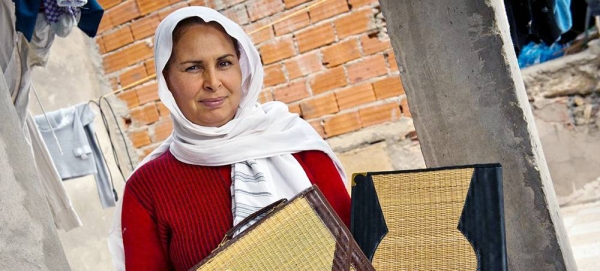
This year’s figures serve as a pre-COVID-19 baseline for the world’s emotional well-being. Many of the 175,000-plus individuals interviewed by Gallup entered the COVID-19 period in an already negative mental state which, according to the study, “may not bode well for their post-pandemic lives.”
Considering the high level of socio-economic and political turbulence experienced by the Middle East and North Africa (MENA) region and Central Asia in recent years, it came as no surprise that Gallup’s 2020 report found many of these areas topped the global chart for negative experiences.
For instance, war-torn Afghanistan posted the lowest positive experience index score in the world for the third year in a row. Its score of 38 on a country-level index of 0 to 100 was even lower than the previous year and reflected the devastating cycle of violence and poverty now typical of Afghans’ daily lives.
In 2019, the 31 percent of Afghans who said that they had smiled or laughed the day before was the lowest on record for any nation.
Just as predictable was the data for Lebanon, a country the Gallup report called “the emotional roller-coaster” where adults experienced the most emotional whiplash of any population in the world between 2018 and 2019.
Their positive experience index score dropped 12 points, while their negative experience score rose 18 points.
Having experienced severe political and economic turbulence for much of 2019, with hundreds of thousands of protesters taking to the streets in October of that year, Lebanon reported the next-lowest index score of 45, marking a new low for the country.
Its positive experience index dropped 12 points in a year, which was the biggest decline of any country between 2018 and 2019 — and this is according to data accumulated before the deadly Beirut port blast of Aug. 4.
“Before the Lebanese revolution in October 2019, we as Lebanese people were somewhere between hopelessness and helplessness. And then with the revolution, we experienced huge emotional shifts into states of hope, engagement, and joy,” Dr. Nayla Majdalani, a clinical psychologist based in Beirut, told Arab News.
"With the deterioration of our economic situation, we experienced increasingly more downs than ups": Dr. Nayla Majdalani
“It has been an emotional roller-coaster. With the deterioration of our economic situation, we experienced increasingly more downs than ups, and we entered again into states of depression and hopelessness.”
But the depression experienced by many Lebanese today is different to that felt before Aug. 4 — a kind of “multi-layered trauma,” Majdalani said. “It is a PTSD depression in the form of trauma, directly linked with the blast and not with the situation.”
In 2019, Lebanese respondents were far less likely to say they had experienced five positive experiences the day before the survey. They were asked whether they felt well-rested, treated with respect all day, smiled or laughed a lot, learned or did something interesting, or enjoyed themselves. The percentages of Lebanese who said they had experienced enjoyment and felt well-rested declined by 18 and 19 points that year over the previous year, respectively.
Just 4 percent of Lebanese respondents rated their lives positively enough to be considered “thriving” — the worst score in Gallup’s record for the country and one of the worst ratings in the world in 2019.
Only Afghanistan, a nation shattered by decades of war and underdevelopment, had worse numbers than Lebanon. No Afghans rated their lives well enough to be considered thriving in 2018.
The Gallup report noted that people in countries with high negative scores in 2019 were typically from nations experiencing socio-political and economic turmoil. (AFP)
“To feel better after a shock like this, what the Lebanese need is justice,” said Majdalani, referring to the explosion, when a huge cache of improperly stored ammonium nitrate caught fire. The resulting blast devastated entire neighborhoods of Beirut and left more than 200 dead and around 6,500 injured.
“As long as there is no justice, the depression of the Lebanese will not be relieved, and it can transform into many different behaviors as the people try to survive. You lose control when you feel helpless.”
Meanwhile, Iraq topped the charts as the most negative country in the world, having already scored some of the highest rates on the negative experience index in previous years. In 2019 its score was 51 — a slight increase on its 2018 score of 49.
Data collected for this score is based on the mean of all valid responses to a series of questions — Did you experience physical pain a lot yesterday? Worry? Sadness? Anger? — multiplied by 100. The higher the score, the more pervasive the negativity in the country.
“All the research states that the emotional costs are much higher for the poor and the vulnerable”: Dr. Saliha Afridi
Iraq’s 2019 score undoubtedly reflected the turmoil in the country, with months of bloody protests that rocked Baghdad and other cities at the end of last year and early this year.
According to Gallup, in late 2019 Iraqis’ approval of their country’s leadership plummeted from an already low 22 percent to just 13 percent. Nine in 10 Iraqis said they believed official corruption was rife.
Negative experiences were common for most of the population last year, with roughly half of Iraqis reporting negative experiences. Iraqis led the world in experiencing anger, with 46 percent saying they felt a lot of anger the previous day.
“All the research states that the emotional costs are much higher for the poor and the vulnerable,” Dr. Saliha Afridi, clinical psychologist and founder of Lighthouse Arabia in Dubai, told Arab News.
“Any countries where you see poverty, where you see rural communities — really vulnerable communities — these are the people that will be hit harder emotionally. They will experience more sadness, more despair, and more anger. They will likely have higher rates of suicide and of substance abuse and lower optimism.”
Although no other country in the world posted a negative experience index score higher than Iraq, the Gallup report noted that people in countries with high negative scores in 2019 were typically from nations experiencing socio-political and economic turmoil.
Chad, for example, was the most negative country in the world in 2018. New appearances on the high negativity chart for 2019 included Rwanda, Afghanistan, Lebanon and Tunisia.
Gallup’s report depicts a world reeling from psychological vulnerabilities even before the pandemic struck. How death and illness, lockdowns, loneliness, and economic devastation have impacted these figures remains to be seen, but the prognosis is not good.
Critics may ask whether a report on emotional well-being really matters in the bigger scheme of things in view of urgent medical and economic challenges that the Middle East and the wider world faces in overcoming the COVID-19 pandemic.
“Emotions are crucial, and it is good (Gallup is) basing the report on emotions,” said Afridi. “It’s like a well-being report. We need to use it in order to move into the future and make better choices. If you take a fragment of a person, you don’t get the full picture, just like with a nation.”
Afridi and others caution that if governments fail to consider the emotional well-being of their publics in crisis-recovery planning, the next contagion to sweep the world may not be a virus but rather a “mental health” pandemic.
Twitter: @rebeccaaproctor











